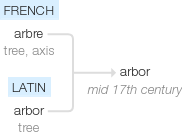Arbor
mid 17th century: from French arbre ‘tree, axis’. The spelling change was due to association with Latin arbor ‘tree’.
wiktionary
From Middle English arbour, erbour, from Old French erbier(“field, meadow, kitchen garden”), from erbe(“grass, herb”), from Latin herba(“grass, herb”) (English herb). (Compare Late Latin herbārium, although erbier is possibly an independent formation.) The spelling was influenced by Latin arbor(“tree”).
Borrowed from French arbre(“tree, axis”), spelling influenced by Latin arbor(“tree”).
etymonline
arbor (n.1)
c. 1300, herber, "herb garden, pleasure garden," from Old French erbier "field, meadow; kitchen garden," from Latin herba "grass, herb" (see herb). Later "a grassy plot" (mid-14c., a sense also in Old French), "shaded nook, bower formed by intertwining of trees, shrubs, or vines" (mid-14c.). It is probably not from Latin arbor "tree" (see arbor (n.2)), though perhaps that word has influenced its spelling:
[O]riginally signifying a place for the cultivation of herbs, a pleasure-ground, garden, subsequently applied to the bower or rustic shelter which commonly occupied the most conspicuous situation in the garden ; and thus the etymological reference to herbs being no longer apparent, the spelling was probably accommodated to the notion of being sheltered by trees or shrubs (arbor). [Hensleigh Wedgwood, "A Dictionary of English Etymology," 1859]
But the change from er- to ar- before consonants in Middle English also reflects a pronunciation shift: compare farm from ferme, harbor from Old English herebeorg.
arbor (n.2)
"main support or beam of a machine," 1650s, from Latin arbor, arboris "tree," from Proto-Italic *arthos, which de Vaan derives from PIE *herdhos "height, uprightness," from root *eredh- "to grow, high" (see ortho-).
